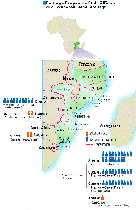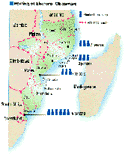II. Japanese Participation in UN Peacekeeping
MOZAMBIQUE
UN Peacekeeping Operations in Mozambique
The United Nations Operation in Mozambique (ONUMOZ) marked Japan's third participation in a UN peacekeeping mission. Japan dispatched contingents of its Self-Defense Force to ONUMOZ from May 1993 to January 1995 to serve as staff officers, movement control units, and electoral observers.
The Republic of Mozambique
| Area: | 800,000km2 |
|---|---|
| Population: | 15.58 million (1993) |
| Capital: | Maputo |
| Ethnic divisions: | 43 indigenous tribal groups such as Makua-Lomwe |
| Language: | Portuguese |
| Religion: | Christianity, Muslim, indigenous religions |
- Posting of Japanese Staff Officers and Component (Final Postings)
- Posting of Electoral Observers
- Outline of the United Nations Operation in Mazambique (ONUMOZ)
1. Staff Officers
Several countries dispatched personnel as ONUMOZ staff officers. In total, approximately 200 personnel served at the general headquarters and regional headquarters in the northern, central, and southern parts of the country.
Japan twice sent five staff officers, with two assigned to the general headquarters in Maputo, Maputo Province, one to the southern regional headquarters in Matla, Maputo Province, and two to the central regional headquarters in Beira, Sofala Province. They conducted surveys and planned the implementation of ONUMOZ's medium- and long-term plans and coordinated transport operations. Cooperating closely with personnel from other countries, they carried out their mission with the utmost dedication by, for example, carrying radio equipment even on holidays in case emergency transportation was requested.
The staff officers endured harsh conditions, living in rental housing and procuring their food supplies locally.


2. Movement Control Units

Units from Japan and Bangladesh served as ONUMOZ movement control units. They primarily coordinated the transport of personnel and cargo at airports and harbors.
Japan dispatched three movement control units of 48 personnel each. The first contingent served from May to November 1993, the second from November 1993 to June 1994, and the third from June 1994 to January 1995.
Of these personnel, 38 served in Maputo and 10 in Sofala. They camped in tents in difficult weather, and depended upon the Portuguese contingent and others for food and water.
Despite the difficult circumstances, they worked diligently from early morning until late at night. Even on weekends, they maintained a state of readiness to ensure a quick response to any unexpected developments.
3. Electoral Observers
Japan dispatched 15 electoral observers to ONUMOZ from October 27 to 29, 1994, to monitor the presidential and legislative elections. The observers were three national government officers, one local government officer, and 11 individuals from the private sector.
The observers were sent to various parts of the country and were teamed with observers from other countries. They monitored the elections to determine whether they were being conducted fairly.
Although the Japanese observers coped with difficult conditions, camping in tents or staying in private homes, they carried out their mission admirably.
Overall, the elections were conducted fairly. Roughly 5.4 million people, or about 88 percent of the electorate, voted.


Back to Index


